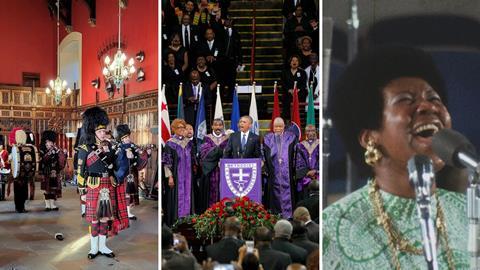As ‘Amazing Grace’ turns 250 years old, historian James Walvin charts it’s unlikely journey from a humble parish church in England to becoming a global recording phenomenon, even adopted by the communities that the hymn’s author was once complicit in enslaving

‘Amazing Grace’ is perhaps the world’s best-known and most popular hymn. It is sung in all corners of the globe, by choirs and soloists, in churches, in major concert halls and at large public gatherings. It has been performed and recorded by every conceivable type of singer and musician, from concert orchestras to steel bands. The music accompanies funerals and state occasions, while the words soothe and reassure. Yet this simple hymn has a complex history.
Humble roots
It was written in the late 18th century for humble parishioners in an rural English church. More startling still, it was written by a former slave ship captain, John Newton. Alongside his other hymns, ‘Amazing Grace’ marks the author’s gradual transition from the brutality of slavery to being an advocate for abolition.
When the hymn travelled across the Atlantic in the 1790s, it’s haunting, soothing refrains took root in the slave communities of the US South, and later became an anthem for African-American life, in freedom as it had in slavery.
How had a simple English hymn become so potent, so popular and so universal?
Between 1948-1959, I was an Anglican choirboy in greater Manchester, yet in all the hundreds of services at which I sang, ‘Amazing Grace’ never featured. It was only in my adult life, as a historian of slavery in the Americas, that the hymn became inescapable. First, via my interest in its author, the slave trader turned abolitionist, John Newton. But then, quite spectacularly, in 2015 when President Obama sang it at a funeral in Charleston.
Presidential plaudits
Obama was giving the oration at the funeral of Rev Pinckney, who had been murdered along with eight of his parishioners, by a racist gunman at a Bible reading class. As the funeral service progressed, to everyone’s surprise, the President began to sing ‘Amazing Grace’. The clerics around him, and then the congregation of 5,000 people, quickly rose and joined in. It was - and remains - a spell-binding moment.
That vast congregation sang the hymn without a printed version of the words to hand. Like millions of people around the world, they knew it by heart.
It was an event that sparked my curiosity. I began to seek an answer to a perplexing historical question: How had a simple English hymn become so potent, so popular and so universal? The answer lies deep in the complex and confusing history of the Trans-Atlantic Slave Trade and its consequences for the modern Western world.
It became an anthem for African-American life
After a wretched and sinful early life, John Newton had found grace - and salvation - after surviving an Atlantic storm that wrecked his slave ship. His conclusion – and the message contained in his sermons, letters and hymns in later life, was that grace was there for everyone. The words of ‘Amazing Grace’ offered hope to all who sought it.
Taking root
For its first 60 years, the hymn was sung to a variety of different tunes. The music we now know was only linked to the words in the 1830s in the USA. Thereafter, both words and music took root and thrived in two critical areas of American musical life: in folk music and in church. In African American churches, ‘Amazing Grace’ became a seminal element of gospel music.
From the mid 20th century, the hymn became a refrain in the growing civil rights movement and was sung wherever protestors marched or camped. At the end of a gruelling - and often dangerous - day’s march, Rev Dr Martin Luther King was often comforted by Mahalia Jackson singing ‘Amazing Grace’ to him down the phone.
When the young folk singer, Judy Collins, joined the campaign, she was alerted to the power and influence of the hymn. Later, in an attempt to calm the tension and anger gripping American society during the Vietnam war, she recorded ‘Amazing Grace’. To everyone’s surprise, her 1970 version became a global hit. A year later, a chance recording by the Royal Scots Dragoon Guards created another unexpected commercial success. And when Aretha Franklin recorded her classic gospel version in 1972, she completed the trio of major hits, each offering a distinctive version.
Between 1970 and the Covid-19 pandemic (when the hymn was recorded by a choir of thousands via digital wizardry) ‘Amazing Grace’ became a global, commercial phenomenon, the centrepiece of major state occasions and was performed worldwide at innumerable musical events.
Of course, the essence of John Newton’s song remains spiritual: it is sung as it was written two centuries ago: as a hymn of worship. Yet Rev John Newton would surely be astounded to learn how his words are now familiar to - and loved by - millions of people in all corners of the world, both religious and secular. It is an astonishing story of hope.
James Walvin’s latest book Amazing Grace is reviewed here. He will be speaking about the book at Waterstones in York at 7pm on Wednesday 22 November. Tickets available here



































2 Readers' comments